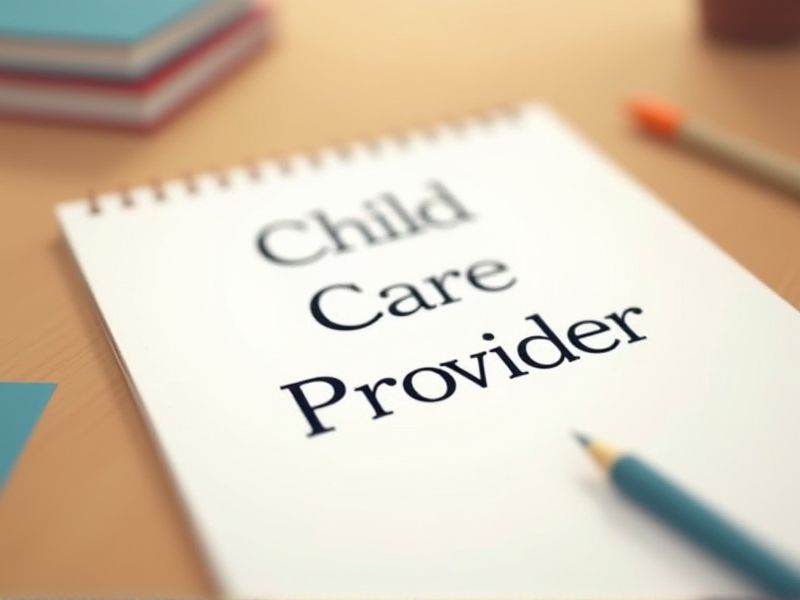
Child care providers play a crucial role in shaping early childhood experiences, making their expertise vital for healthy development. Certifications ensure that providers meet established standards of safety, care, and educational best practices. These credentials help assure parents that their children are in capable and knowledgeable hands. Some important certifications you may need as a child care provider include child development, first aid, and CPR.
Child Development Associate (CDA) Credential
The Child Development Associate (CDA) Credential enhances the professional development of childcare providers by standardizing knowledge, skills, and competencies in early childhood education. Research shows that educators with specialized training in child development positively influence children's cognitive and emotional growth. The credential supports the quality assurance of childcare services, as it aligns practitioners with nationally recognized best practices. It also increases a provider's employment opportunities and recognition in the child care sector.
Pediatric First Aid & CPR Certification
Pediatric First Aid & CPR Certification equips child care providers with critical skills to effectively respond to emergencies, significantly reducing the risk of harm to children. Certification ensures that providers can quickly assess and manage situations like choking, allergic reactions, and cardiac arrest, minimizing the potential for severe outcomes. Parents feel more secure and confident entrusting their children to providers who are certified, resulting in increased trust and business for child care services. Regulatory bodies and licensing agencies often require this certification, aligning child care providers with legal standards and industry best practices.
Early Childhood Education Certification
Early childhood education certification equips child care providers with specialized knowledge in child development stages, leading to more effective care and learning environments. Certification ensures providers understand child safety regulations and health standards, reducing the risk of accidents and health issues. Providers with certification can use evidence-based teaching strategies, promoting better cognitive and emotional development in children. Having certified staff increases a center's credibility, attracting more parents seeking high-quality care for their children.
Health and Safety in Childcare Certification
Health and Safety in Childcare Certification equips providers with the essential knowledge to prevent and respond effectively to emergencies, reducing risk of injury or illness. Acquiring this certification ensures compliance with legal and regulatory standards, which minimizes liability for childcare facilities. This qualification enhances trust with parents, as they prefer sending their children to certified providers who demonstrate commitment to child welfare. Proper training cultivated through certification can improve the overall quality of care, fostering a safer and more nurturing environment for children.
Child Abuse Prevention Training
Child abuse prevention training equips child care providers with crucial skills to recognize early signs of abuse and neglect, fostering early intervention and support. Knowledge from such training ensures providers follow legal reporting requirements, safeguarding children's well-being. Providers trained in prevention can create a safe and supportive environment, reducing the incidence of harm. Continuous education in this area enhances provider awareness and accountability, promoting healthier developmental outcomes for children.
Infant and Toddler Care Certification
Infant and Toddler Care Certification ensures that child care providers possess the necessary skills to meet the developmental needs of young children effectively. This certification verifies that providers understand crucial safety protocols, reducing the risk of accidents or harm. It demonstrates a provider's commitment to maintaining high standards of care, which builds trust with parents. Certified providers are equipped to create enriching environments that support early cognitive and emotional development.
Special Needs Care Training
Many children with special needs require tailored approaches to learning and development, necessitating specialized training for caregivers. Without specific training, caregivers might lack the skills to effectively address unique challenges such as communication barriers or sensory sensitivities. Proper training enables caregivers to create inclusive environments, ensuring that all children thrive alongside their peers. Informed caregivers are better equipped to collaborate with families and health professionals, promoting a holistic approach to the child's well-being.
Nutrition & Food Safety Certification
Child care providers must understand the critical role nutrition plays in the development of children, impacting their physical health, cognitive function, and behavioral patterns. Certification in nutrition and food safety ensures that providers are equipped with the knowledge to prepare balanced meals, addressing the dietary needs specific to different age groups. This certification aids in the prevention of foodborne illnesses by adhering to safety standards, reducing risks associated with improper food handling. By maintaining these standards, childcare providers create a healthier and safer environment, fostering optimal growth and development in children.
Safe Sleep & SIDS Prevention Certification
Safe Sleep & SIDS Prevention Certification equips child care providers with crucial knowledge to create a safer sleeping environment for infants, significantly reducing the risk of sudden infant death syndrome. Standardized training ensures consistent practices across all care settings, helping providers understand triggers and the importance of safe sleeping positions. Certification fosters trust among parents, ensuring their child's safety is prioritized and informed by the latest guidelines. Without this certification, providers may inadvertently engage in unsafe sleep practices, increasing the risk of preventable tragedies.
Autism Spectrum Disorder (ASD) Awareness Training
Increased awareness of Autism Spectrum Disorder (ASD) among child care providers leads to improved identification and support for children with ASD, promoting better developmental outcomes. When providers are trained, they can create inclusive environments that accommodate the diverse needs of children on the spectrum. ASD awareness training equips caregivers with strategies to manage sensory sensitivities, communication challenges, and social difficulties, reducing stress and fostering positive interactions. Well-informed providers can also educate families and communities, enhancing overall understanding and acceptance of individuals with ASD.
Summary
By obtaining certifications, you enhance your credibility as a Child Care Provider. This often leads to increased trust from parents, resulting in more clientele and potentially higher income. The certifications equip you with specialized skills, improving the quality of care provided to children. As a result, children benefit from a more enriched learning environment, promoting their development and well-being.
